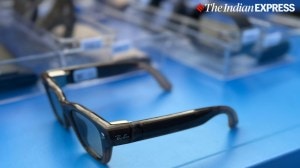Scenes unseen in Valley: VIPs talk power sharing
Amid tight security, PM A.B. Vajpayee inaugurated the meeting of Inter-State Council today here today — the first time the forum is bei...

Amid tight security, PM A.B. Vajpayee inaugurated the meeting of Inter-State Council today here today — the first time the forum is being held outside Delhi — with an assurance that the government would step up its ‘‘sincere efforts’’ to advance the dialogue process. And shedding the Centre’s hesitation in talking with the Hurriyat, the PM again asserted that the doors were open to all those who ‘‘reject militancy and extreme positions and wish to play a constructive role’’ in the peace process.
The violent incidents and bandh notwithstanding, the significance of Inter-State Council meeting could not be undermined. In addition to Dy PM LK Advani, those on hand included Union ministers George Fernandes, Arun Jaitley and Sahib Singh Verma and Chief Ministers of 15 states.
|
Anti-Modi protests
|
|
• Gujarat CM Narendra Modi’s Kashmir visit has become a tool for separatists to protest against the inter-state CMs’ conference. JKLF vice-president and Hurriyat leader Shahidul Islam were arrested while trying to take out a procession in Maisuma area. • Militants blew up a bomb fixed in a night-bunker on Tehsil Road, Baramulla causing injuries to one jawan of 46 RR. A bomb found in a pill box was defused by sleuths of bomb disposal squad. (ENS) |
Vajpayee, in his speech, noted the significance of the venue. ‘‘A meeting of the country’s apex forum of cooperative federalism taking place in Srinagar is yet another message that the situation in the state is changing’’, he said.
Extending ‘‘maximum help’’ to the state to consolidate recent gains, Vajpayee again thanked the state’s people for showing their faith in democracy in the face of grave threats. The elections last October would, he said, go down in world history as the ‘‘finest victories for the ballot, in its battle against the bullet.’’
Introducing the Action Plan on Good Governance, a main item on the agenda, Vajpayee — laying emphasis on private enterprise — unveiled the elements as a comprehensive legal framework, defended and enforced by an impartial and competent judicial system, an accountable executive, coupled with a people-friendly bureaucracy and a strong civil society participation.
A visibly happy Mufti Mohammad Sayeed, the host CM, said he saw Kashmir as the ‘‘Davos of the East’’. In fact, he added, the state was home to a hundred ‘‘potential Davoses, Kyotos and Genevas.’’ And the progress India makes in its road to peace will determine how soon Kashmir could host the ‘‘first conference from neighbouring countries as well.’’
Also discussed at the meeting were the Sarkaria Commission’s recommendations on Centre-State relations, including the much-debated Article 356 pertaining to imposition of emergency in a state. As expected, there was opposition from various states, including West Bengal and Bihar. A final decision is likely to be taken tomorrow in the concluding session of the meet.
Photos


- 01
- 02
- 03
- 04
- 05



























